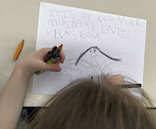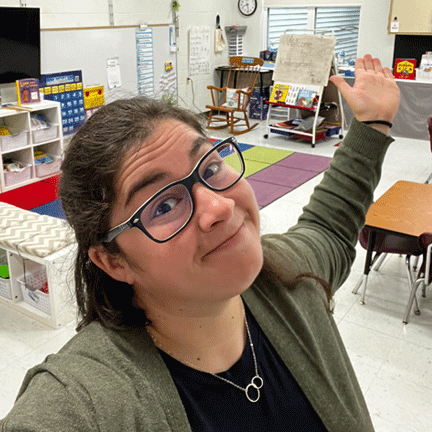As we sang our class song, I realized I had made a mistake on the chart paper in one part of the first verse. When we finished singing, I said, “Friends… you know how we sing ‘I can take on what each day brings’ in this last part? Well, for some reason, when I was writing it on the chart paper, I wrote ‘we can face what each day brings.’ I made a mistake… but it’s okay to make mistakes, right?”
A chorus of “yes!” rang through the room, except the one little “no” that could be heard, not far from my feet. I looked down to see our newest friend confusedly looking around at her peers. Scarlett was certain that it was not okay to make mistakes… that in fact, it was a bad thing to make mistakes… and yet here were 17 of her peers disagreeing. I looked down with a slight smile and said, “We make lots of mistakes in this class—that’s part of how we learn.” I looked up and across our rug, and thought about how this class has evolved this year.
In a new-to-me situation, we had half of another class merge with ours at the end of October and faced the reality of adding 50 percent new kids to our class. We had to essentially restart the year in regard to building class community and a mindset that accepted mistakes and doing hard things. Those first few weeks were filled with our newer friends overcoming frustration and uncertainty with the support of the original class cheering them on. We spent a lot of time talking through the mistakes we made and what they led us to do next. I made many intentional mistakes and gave space for kids to help me through them.
Fast-forward to this day in early January when I expected my statement about mistakes being okay to be a small reminder to my students. I found myself looking at Scarlett, and I realized we had to take a few steps back and build this mindset with her, too. In that moment, I had to choose how to proceed. Was it more important to go on with the reading minilesson I was about to teach or to stop and talk through mistakes?
When moments like this arise in our days as teachers, it’s often more important to stop and have the conversation. Having the conversation about mistakes will build the foundation of safety and curiosity about mistakes in the days and weeks to come. I’ve come to learn that taking the time to focus on a topic or skill at the beginning (even if the beginning is the middle of the year) leads to spending less time trying to reinforce or establish an understanding of a topic or skill over time.
Mistakes are actually important. Here’s why:
The language we use around mistakes is an indicator of how we think and feel about them. The simple differences between
“I make a lot of mistakes,”
“I work hard to fix my mistakes,” and
“I am a problem solver”
show a significant difference in mindset and belief system. The evolution from the first statement to the last is representative of the evolution my students go through as the year progresses. When a child is able to shift from an identity of making a lot of mistakes and seeing it as a problem to knowing when a problem needs to be solved and how to do it, they are able to eliminate the fear they are feeling as a part of the equation of learning for them. When we can eliminate that fear, we open up doors to so many possibilities for them!
In a culture of more is better and perfection is what’s desired, taking risks and making mistakes is not typically seen as okay. The irony is that brain research literally shows that making mistakes leads to stronger learning and more accurate results in the long run. When we make a mistake, our brain actually slows down and takes the time to analyze the situation closely, allowing for a more accurate next attempt. In this analysis we reach a higher level of thinking—critical thinking, which is the foundation for new questions, ideas, and learning.
Together, let’s build a community of mistake makers.
Just like we want our students to see themselves as readers, mathematicians, writers, problem solvers, and much more, we want them to see themselves as mistake makers. Building a community of mistake makers starts the moment kids walk through the door.
When you see a mistake in progress, don’t let yourself step in or say a thing. Make yourself take a deep breath, maintain a neutral face, and watch. Notice what is happening, think about what happened just before, watch how the child is reacting, reflect on what is leading the child to make the choices they’re making, and think about the thinking work the child is doing in that moment.
Keep waiting. What happens next? What is the impact of the mistake? Does the child realize the mistake? Should they? What might the child need to do next? The following table outlines ways to respond to mistakes.
Responses to Mistakes
|
Response |
Example |
| Acknowledge and move on
Sometimes a mistake is something we just need to name and move on from. The impact is small or nonexistent, and all we need to do is tell ourselves, That was a mistake, and move on. |
A child turns a book page suddenly and makes a small rip in the page. The child goes to an adult, owns the mistake, and is able to move on without guilt or fear. |
| Apologize
When we make a mistake that has a negative impact on someone else, we apologize for that impact. “I’m sorry my choice made your life harder,” is one response. |
A child bumps into another child on their way to the rug. The bumper says a quick, “I’m so sorry I bumped into you,” and everyone moves on. |
| Redo
When we make a mistake doing something and the result we get isn’t what we were hoping it would be, we try again. |
A child is stapling another page onto their booklet. They realize they’ve stapled the side of the booklet that is supposed to open. They take out that staple and staple the correct side on their second attempt. |
| Reflect
Sometimes a mistake happens and we can’t fix it. But we can stop and think about why and how it happened so we don’t make the same mistake again. |
You make 19 copies of an announcement paper instead of 20. In the moment, you can’t make another copy appear. However, you can make a mental note to double-check your count before making copies next time. |
| Ask for help
Sometimes a mistake happens and it’s not something we know how to do differently or better, so we need to ask someone for help. |
You accidentally unplug your Apple TV when you mean to unplug your projector. When you plug it back in, it resets and you need a login… You call someone on the technology staff to come and help you log back in. |
The next time you make a mistake, stop and think, How did it help you learn and grow? If we want kids to grow up and become critical thinkers and problem solvers, we need to give them the space now to explore what those roles mean and how to fully embrace them as part of their character.



